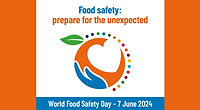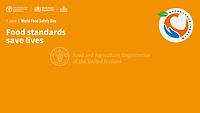Resources to “Prepare for the Unexpected” on World Food Safety Day 2024

In an increasingly globalized world that is experiencing changes in climate, pandemics, and other agriculture- and supply chain-disrupting events, opportunity grows for food safety to become compromised. To quickly address and contain negative consequences to food safety in the event of emergency, there is a need for collaboration and communication among competent authorities and food industry stakeholders worldwide.
Organized by the Food and Agriculture Organization of the United Nations (FAO) and the World Health Organization (WHO), the sixth annual World Food Safety Day (WFSD), which takes place on June 7, 2024, encourages food safety competent authorities, food businesses, and other stakeholders in the food supply chain to “Prepare for the Unexpected.” In recognition of WFSD 2024, this article discusses FAO/WHO’s involvement in global food safety emergency preparedness and its historical intersections with WFSD, and shares resources to help food safety actors build resiliency against incidents like natural disasters and foodborne illness outbreaks.
The idea of WFSD was first proposed in 2016 at the 39th session of the FAO/WHO Codex Alimentarius Commission. In 2018, at the 73rd session of the UN General Assembly, a resolution was adopted that recognized the global burden of foodborne disease (according to FAO/WHO, foodborne illness is responsible for 420,000 preventable deaths every year) and officially established WFSD to strengthen and elevate global food safety efforts. The first WFSD took place on June 7, 2019.
The theme “Prepare for the Unexpected” was chosen for World Food Safety Day 2024 because 2024 also marks 20 years since the formation of FAO/WHO’s International Food Safety Authorities Network (INFOSAN), which serves the critical purpose of connecting food safety authorities across the world to facilitate information-sharing about food safety emergencies. The rapid information-sharing enabled by INFOSAN has improved the prevention, detection, and management of contamination along food and feed supply chains.
Additionally, FAO/WHO’s Codex Alimentarius Principles and Guidelines for the Exchange of Information in Food Safety Emergency Situations (CXG 19-1995), which provides uniform advice for responding to food safety emergencies, supports the necessity of INFOSAN, stating, “Due to trade globalization and increased import/export operations, it is possible that the management of a food safety emergency is the responsibility of more than one competent authority, and timely and coordinated collaboration among all relevant stakeholders, including food business operators and consumers, is required to ensure an effective response.”
WFSD-Inspired Food Safety Initiatives Led by International Competent Authorities
The impact of WFSD grows every year, with more and more countries taking the opportunity to elevate the status of food safety. Leading up to WFSD 2024, FAO/WHO have highlighted a number of countries that are engaging in activities to enhance national food safety.
For example, in Kenya, the Ministry of Health is holding a three-day conference bringing together regulators and industry, which aims to strengthen partnerships, build capacities, and demystify the theme “Prepare for the Unexpected.” Additionally, in Egypt, the National Food Safety Authority (NFSA) held a symposium in commemoration of WFSD that focused on modern food control systems as a driver for innovation and investment in the agrifood sector. The symposium was followed by a series of global food safety discussions, hosted by the Egyptian Chamber of Food Industries and the Global Food Regulatory Science Society, to facilitate international collaboration, especially across the African continent.
In Türkiye (Turkey), the National Ministry of Agriculture and Forestry (MoAF) has organized an event to commemorate WFSD 2024 in collaboration with the Federation of Food and Beverage Associations of Türkiye, the country’s largest non-governmental food and beverage industry organization. Taking place on June 7, the day-long series of expert presentations and panels will elevate importance of food safety and highlight the efforts of MoAF and its partners regarding food safety regulation and crisis preparedness.
On July 1, for the third consecutive year, the Kingdom of Saudi Arabia is hosting a dedicated forum in honor of WFSD 2024, in alignment with the official WFSD theme. The commemorative event has grown to become the largest food safety gathering in the Kingdom’s history, as well as the largest food professional gathering in the Gulf Cooperation Council (GCC), Middle East, and North Africa. The purpose of the forum is to create a platform for food safety professionals to elevate regional public health and hygiene as it relates to food, and to contribute to the achievement of the UN Sustainable Development Goals.
Resources and Open Events to Help Food Safety Stakeholders Prepare for the Unexpected
There are a number of resources and events being offered to all food industry stakeholders and the general public that are helpful in “preparing for the unexpected.” In addition to the aforementioned Codex Guidelines for Exchanging Information in Emergencies, the following industry-relevant resources and articles can be referenced to guide food safety preparedness efforts and increase knowledge about unexpected or unprecedented threats to food safety:
Informational Content
- “Applying Foresight to Navigate Opportunities and Challenges amid an Evolving Food Safety Landscape”: Authored by FAO food safety officials, this article from Food Safety Magazine discusses the concept of foresight, and how it enables strategic preparedness in food safety to address vulnerabilities and ensure resilience
- “Climate Change and Emerging Risks to Food Safety: Building Climate Resilience”: An article from Food Safety Magazine that discusses cross-sectoral solutions to adapt to the multiple emerging food safety risks posed by climate change
- “Supply Chain Management: A Year in Review”: An article from Food Safety Magazine that examines how food supply chain stakeholders can better understand unexpected supply chain disruptions by employing broader scenario planning and more rigorous work processes, drawing upon lessons learned from recent and unprecedented real-world events
- “World Food Safety Day 2024 with Mick Miklos: Prepare for the Unexpected”: Dropping June 7 on food-safety.com and all major podcast players, this bonus episode of Food Safety Matters features foodservice industry leader Mark (Mick) Miklos, CP-FS, who shares his past experience building Waffle House’s renowned emergency operation protocols, and why it is critical to “Prepare for the Unexpected.”
Practical Toolkits and Guidance
- “Early Warning Tools and Systems for Emerging Issues in Food Safety”: An FAO publication that provides an in-depth review of early warning systems for food safety risks, an explanation of available open access tools, and the potential applications of Big Data and artificial intelligence (AI) in the field
- “Illicit Trade in Food and Food Fraud”: A World Trade Organization (WTO) document that explores the challenges of and provides guidance for combating food fraud and illegal practices in food trade
- "Introductory Guide to FDA's Final Food Traceability Rule:" A primer on what companies need to know to comply with the U.S. Food and Drug Administration (FDA) Food Traceability Final Rule, offered by the Institute of Food Technologists (IFT).
- “Protect Food and Water During Hurricanes and Other Storms”: Various FDA guidance for food growers, manufacturers, holders, and transporters experiencing extreme weather that compromises food safety
- “Resources for Flooding”: Compiled by the U.S. Northeast Center to Advance Food Safety (NECAFS), this resource contains a comprehensive list of information and tools that food producers can refer to when understanding how to respond to flooding, including federal guidance, assessing risk, decision support, and food handling and processing recommendations
- “Risk-Based Food Inspection System: Practical Guidance for National Authorities”: A WHO publication for national food safety authorities that describes how to design, implement, and communicate a risk-based food inspection system
- “WFSD 2024: Communication Toolkit”: The official communication toolkit for WFSD 2024 created by FAO/WHO
- Educational webinar archive: The International Association for Food Protection (IAFP) is offering free access to its archive of more than 100 recorded webinars for the month of June 2024 only.
Webinars
- “Discover USDA’s National Agricultural Library’s Food Safety and Nutrition Resources and Tools During World Food Safety Day”: On June 7 at 1:00 P.M. ET, the U.S. Department of Agriculture (USDA’s) National Agricultural Library will hold an hour-long event to highlight credible resources aligned with the theme of WFSD 2024
- “Driving Food Safety Innovations Across Europe”: On June 7 at 10:00 P.M. CEST, the European Federation of Food Science and Technology (EFFoST) EU Horizon Project, Catalyzing Scientific Innovation into Food Safety Action (CATALYSE), will hold a two-hour webinar to promote the implementation of innovative food safety solutions that solve the real-world needs of end-users in the food supply chain
- “Food Safety: Prepare for the Unexpected”: On June 7 at 11:00 A.M. Columbia Standard Time, a free, Spanish-language webinar hosted by the Latin American and Caribbean Association of Food Science and Technology (ALACCTA) will feature presentations by industry experts on how to build resilient food safety plans (in Spanish only).
Looking for a reprint of this article?
From high-res PDFs to custom plaques, order your copy today!






